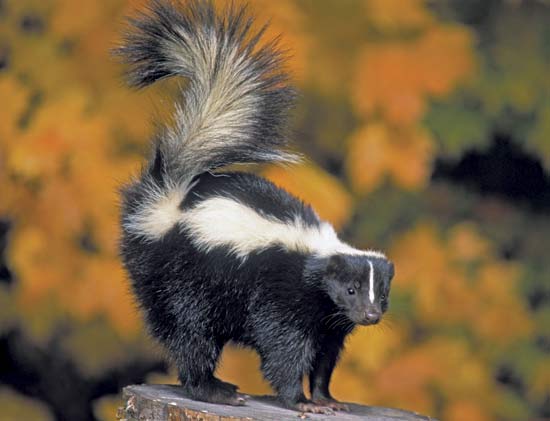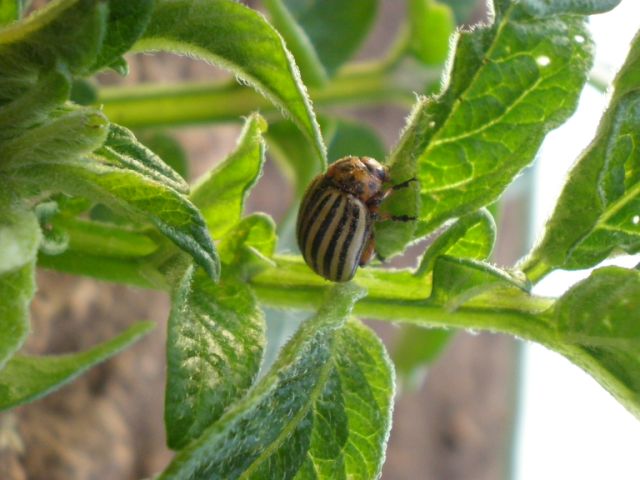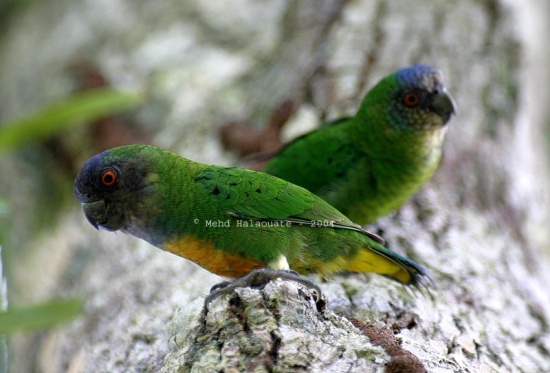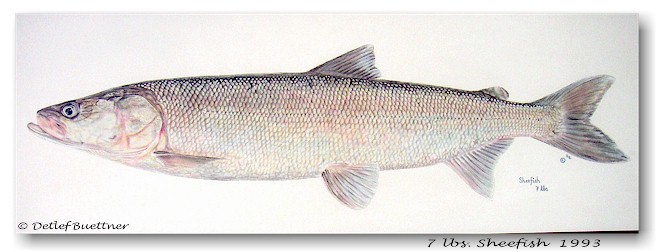
I am going to assume that everyone had an amazing Canada Day. I hope my non-Canadian friends had a great day yesterday as well. We are going to end this shortened work week with a Wild Fact that stinks. No I really mean it, we are talking about the Striped Skunk today.
The Striped Skunk can be found throughout most of North America and carries a strong stench with it wherever they go. In fact the odour that they produce can be smelled from a kilometer away. I guess that isn’t that impressive since I can be smelled from 2 kilometers away after my annual camping weekend with the guys. The skunks pungent odour is created by a thick, yellow, oily fluid or musk and is secreted by two glands located at the base of their tail. This musk is only discharged as a last ditch effort to thwart a potential enemy. The striped skunk will growl and hiss at you long before spraying. Heck, they will even try walking on their front legs with their tail raised to scare you. So you know the Striped Skunk does not spray in this position. They will need to put their body in a U-Shape so its face and tail are facing the attacker. At this point they can spray their musk up to a distance of 6 m (18′) and are incredibly accurate within a 3 m (9′) range. The smell of the skunk is so bad that the skunk itself can’t stand it so they won’t use this defense mechanism in a confined space but I am not brave enough to test that theory.
The Striped Skunk will feed on a wide variety of food including insects, rodents, baby rabbits, bird eggs and plants. They are especially fond of grasshoppers, crickets and cutworms but they will also feed on bees and wasps. They are the true definition of an omnivore. By autumn the skunk has put on a nice layer of fat and are ready to begin hibernating in one of their deep dens. Some dens have been known to have 20 skunks curled up together but it is usually less than that. Typically the female and babies will head to the den when the temperature reaches zero degrees Celsius. The males will join in with their family or den alone once the temperature drops to minus ten degrees Celsius. I wish I could start to hibernate once the temperature drops below zero degrees.
Well that does it for this stinky fact. Have a great weekend everyone!







Gosh, and does that smell ever linger for a long time. Skunks are sure cute, though. We see them and their families out and about here in the San Francisco suburbs from time to time.
hahaha! The smell sure does linger. They are definitely a potent little animal.
That is nice that you get to see a family of skunks. Even though they stink the babies are definitely cute. Just don’t get too close!
Skunks are adorable and sometimes disturbingly friendly. There are loads of them here in the neighborhoods of Southern California and I see them while I’m out walking in the early evenings. Not too long ago, I stopped to talk to one and when I resumed walking up the hill to my house, it started following me! I had to dodge it so it didn’t find out where I lived – we have a dog who has already been sprayed… twice!
That is an awesome story, Janiss! I have never had a skunk follow me. Then again, I have never stopped to chat with a skunk. It must have been a pretty good conversation since the little guy wanted to continue talking with you.
It is never fun when your dog gets spayed. A good ol’ tomato juice bath should do the trick though.
Fact is, though, skunks don’t hibernate. And sorry, Nathan, but tomato juice only masks the sent. I’ve been doing some research on skunks for science. I love my book for science. So many cool facts.
P.S not meaning to insult you guys or anything.
Thank you for your comment. You are absolutely right about skunks not hibernating. They are not true hibernators and will actually exhibit “torpor” throughout the winter. This means they may sleep for weeks at a time but will come out on warm days and look for food. Thank you for catching that miscue in the post. I will be editing that shortly.
Again you are right with the scent being masked by the tomato juice. I am not sure if I implied that it would remove the scent altogether. I am sure if I am sprayed by a skunk I would be happy at masking for a bit but would want to find something that removes the scent altogether. During your research, did you find anything that actually removes the scent or have any good tips?
Thanks again for your comments. They are greatly appreciated.